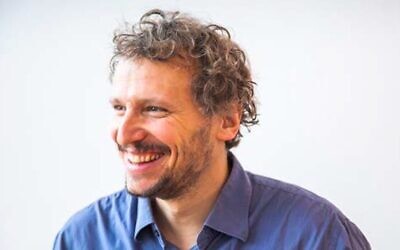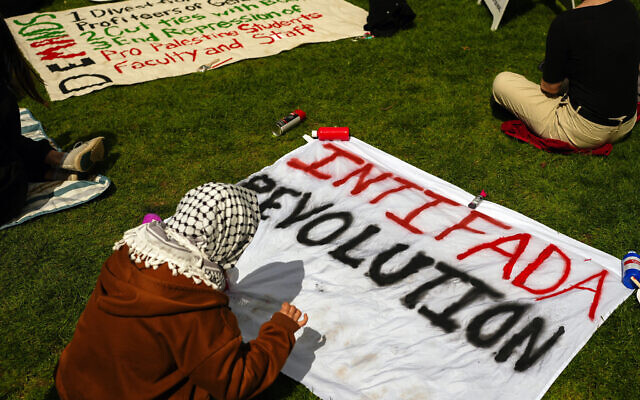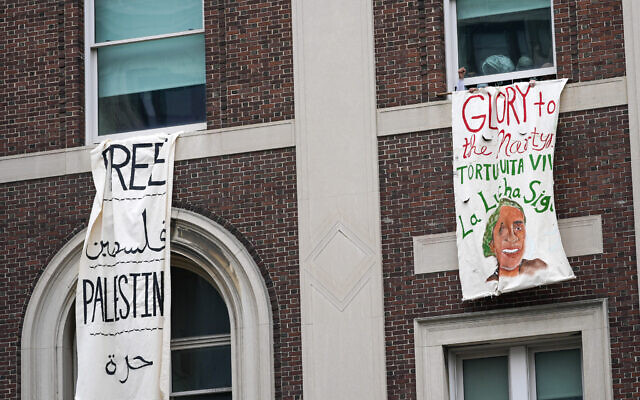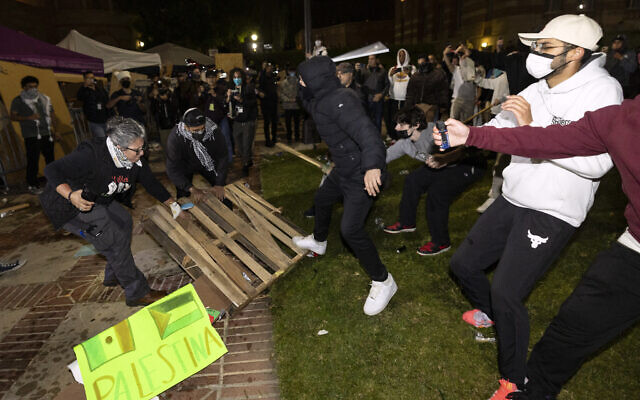How an ex-Nazi found UK soccer stardom thanks to a refugee rabbi’s intervention
Docudrama ‘The Keeper’ tells the amazing true story of Bert Trautmann’s journey from German POW to Manchester City goalie. But questions remain over his wartime service in Ukraine
 David Kross as Bert Trautmann in 'The Keeper' (Jürgen Olczyk/Menemsha Films)
David Kross as Bert Trautmann in 'The Keeper' (Jürgen Olczyk/Menemsha Films)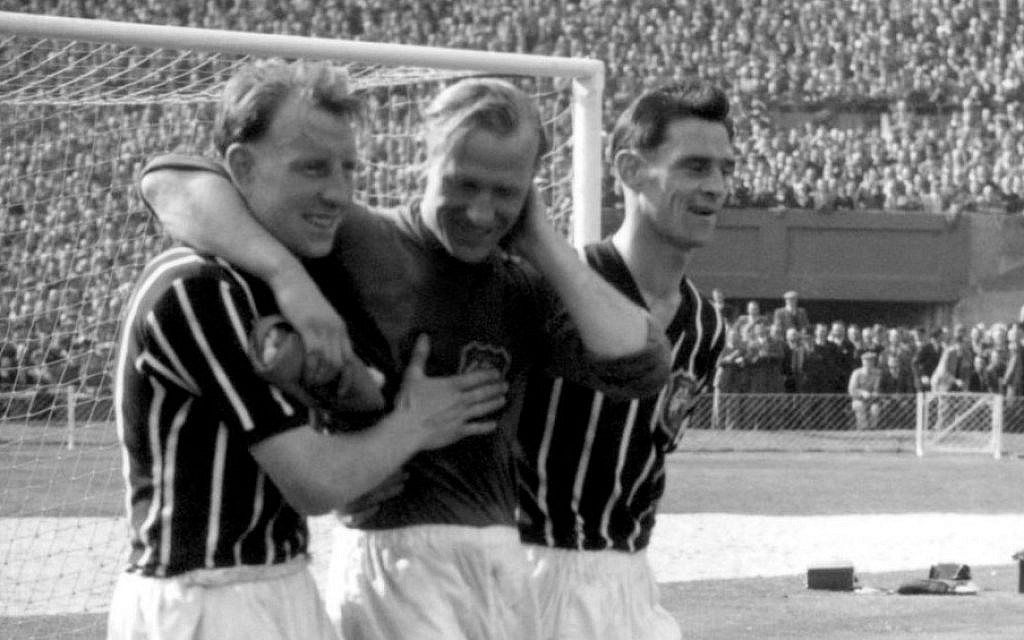 FILE - A May 5, 1956 photo from files of Bernd Trautmann, more commonly known as Bert, Manchester City's German-born goalkeeper, center, being assisted from the pitch by two unidentified players, suffering from a broken neck, during the FA Cup final against Birmingham, at London's Wembley Stadium. (Photo credit: AP/PA, File)
FILE - A May 5, 1956 photo from files of Bernd Trautmann, more commonly known as Bert, Manchester City's German-born goalkeeper, center, being assisted from the pitch by two unidentified players, suffering from a broken neck, during the FA Cup final against Birmingham, at London's Wembley Stadium. (Photo credit: AP/PA, File) David Kross as Bert Trautmann and Freya Mavor as Margaret Trautmann in 'The Keeper' (Jürgen Olczyk/Menemsha Films)
David Kross as Bert Trautmann and Freya Mavor as Margaret Trautmann in 'The Keeper' (Jürgen Olczyk/Menemsha Films) Bert Trautmann (played by David Kross), defends the goal in football game in POW camp in Lancashire, England in 1947 in 'The Keeper.' (Jürgen Olczyk/Menemsha Films)
Bert Trautmann (played by David Kross), defends the goal in football game in POW camp in Lancashire, England in 1947 in 'The Keeper.' (Jürgen Olczyk/Menemsha Films) David Kross as Bert Trautmann in 'The Keeper' (Jürgen Olczyk/Menemsha Films)
David Kross as Bert Trautmann in 'The Keeper' (Jürgen Olczyk/Menemsha Films)
German-Jewish refugee Rabbi Alexander Altmann was a respected scholar who served as the communal rabbi for Manchester, England from 1938 to 1959. Although an expert on German-Jewish philosopher Moses Mendelsohnn, dedicated football (soccer) fans remember him for a very different reason: An open letter he wrote to the Manchester Evening News in October 1949.
At the time, some 20,000 fans were protesting the appointment of a former German prisoner of war named Bert Trautmann as the Manchester City Football Club‘s new goalkeeper. With Anti-German sentiment still strong in the post-war years, fans of the future Premier League club (especially local Jews) were not in favor of bringing on a former Nazi — no matter how talented a player he was.
Altmann lost his parents and other family members in the Holocaust, but declared his acceptance of Trautmann and encouraged others to do so.
“Each member of the Jewish community is entitled to his own opinion, but there is no concerted effort to end our support for Manchester City Football Club… If this goalkeeper is as they say, a decent fellow, I would say there is no harm in him playing football. Each must be judged on his own merits,” Altmann wrote in his influential letter.

Altmann’s ability to forgive but not forget is portrayed as a pivotal moment in “The Keeper,” an accomplished feature film depicting Trautmann’s story that premieres in the United States virtually and in select open theaters on October 2.
The film’s director and co-writer Marcus H. Rosenmüller, 47, had never heard of either Trautmann or Altmann before his producing partner brought him the story.
“I played football from age five to 42. I was a middle class amateur player until my knees couldn’t take it anymore. I was really surprised that I hadn’t heard of Trautmann, especially since I was so into the sport and read so much about it,” Rosenmüller said in a phone interview from northern Bavaria, where he was shooting a film.

David Kross, who plays Trautmann in “The Keeper,” was also unaware of Trautmann as he played soccer while growing up near Hamburg.
“But when I was approached about the film, I read the biographies there are of him, and his journey from growing up in Nazi Germany to becoming a sports legend in the UK seemed like it would make for an interesting movie,” Kross said from his home in Hamburg, where he moved recently from Berlin.
Trautmann’s reputation as “a living legend” and one of the greatest goalkeepers of all time was cemented in the last 17 minutes of the 1956 FA Cup final, when he continued to play with a broken neck to ensure that Man City kept its lead to win.
According to Kross, 30, he read many iterations of the film’s script in the handful of years before filming began in 2017 in Munich and Belfast, Northern Ireland. Scenes of Trautmann’s years in the Hitler Youth, and his service as a Luftwaffe paratrooper were in earlier drafts, but did not make it into the final version.
Ultimately, the decision was made to focus mainly on the love story between Trautmann and his wife Margaret Friar (Freya Mavor), whom he met in 1947 when her father — the coach of a local team — discovered him as he played soccer with other inmates at a POW camp in Lancashire. Jack Friar (John Henshaw) was not thrilled to take a German under his wing, but he was desperate to replace an incompetent goalie with one who could help his team win.
The film’s plot traces the development of the young couple’s relationship as it paralleled Trautmann’s rehabilitation and refusal of an offer to repatriate. It also charts his advancement from the local team to Man City after being scouted by Man City’s coach Jock Thompson (Gary Lewis). Trautmann ultimately became an exemplary player — he was awarded FWA footballer of the year for 1955-56 — and recognized by both the British and German governments for his work in promoting Anglo-German relations.

In what is surely a fictionalized version of events, the film shows Margaret standing up to a group of Man City fans and officials opposed to hiring her husband. In that scene, the rabbi, who was earlier shown telling the team owner that he understood the fans’ call to boycott, has a change of heart that leads to his open letter.
“You can’t hold one man responsible for all that happened… I didn’t know him as a soldier. I only know him as a man… You lot band together to break a man who is already broken instead of helping him find a future — and all because it’s easier than forgiveness. You know, you’re not better than the people you accuse,” Margaret says.
Trautmann and his wife’s relationship was tested shortly after the FA Cup win and Traumann’s injury, when their son was killed in an accident.
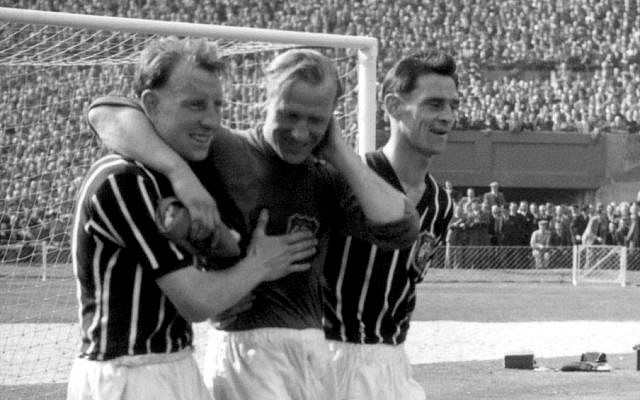
“The Keeper” depicts Trautmann dealing with his grief through the belief that his young son’s death is a karmic repayment for his inaction during massacres he witnessed perpetrated by German forces in Ukraine. In the film, this is symbolically portrayed by appearances of a haunting small child who was shot and killed by one of Trautmann’s comrades as he stood by.
Rosenmüller reported that when he met the gentlemanly and charismatic Trautmann in 2012 at his home in Spain, he admitted to overhearing shots in a Ukrainian forest where 40 or 50 Jews were murdered in 1941. He did not intervene, and he stayed silent about it.
The director said that the retired footballer, who died a year later at age 89, maintained that as a soldier brainwashed by Hitler’s regime, he had no choice.
“Growing up in Hitler’s Germany, you had no mind of your own,” Trautmann told The Guardian in 2010.
As for why he volunteered for the Luftwaffe at 17, he said, “When you are a young boy war seems like an adventure. Then, when you’re involved in fighting it’s very different, you see all the horrible things that happen, the death, the bodies, the scariness. You can’t control yourself. Your whole body is shaking and you’re making a mess in your pants.”
Trautmann told Rosenmüller that his second life began in the POW camp. “He said he knew inside that he had failed [morally] during the war,” the director said.
Tony Kushner, a professor of Jewish/non-Jewish relations at the University of Southampton and lifelong Man City fan, speculated in a conversation with The Times of Israel that Trautmann’s whereabouts in the war, and whether he personally committed any war crimes, has not fully come to light.

Although Trautmann biographies have been published over the years, most recently in 2009 and 2011, Kushner said it would be possible for a top-notch historian to dig deep into Nazi and other wartime records to track Trautmann more accurately during his three years fighting on the Eastern front, as well as the year he fought in France before his capture by Allied forces.
It is established early in the film that Trautmann was awarded the Iron Cross and other medals for bravery, but whether he was a member of the Nazi party (which he was) is left ambiguous. In real life, there was enough evidence against Trautmann to initially classify him as “black” (an unrepentant Nazi) at the POW camp.
As to why Altmann would be willing to write his influential letter in support of Trautmann, Kushner said he thought it reflected the rabbi’s personality and generous nature. The gesture was also in line with the times, during which the focus was on moving beyond the war and on countering the Communist threat to Europe. In addition, Jews were trying to to deflect accusations of dual loyalty in the wake of the establishment of Israel a year and a half earlier.
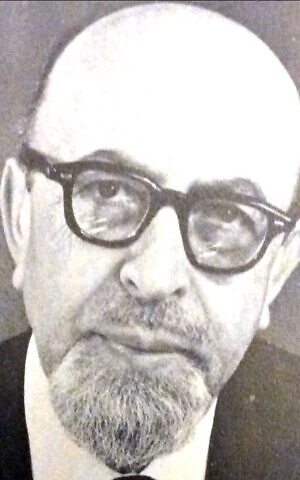
The creators of “The Keeper” decided to present Trautmann’s story as it would have unfolded at the time. Little if anything would have been known in the late 1940s about Trautmann’s war record. More is known now, and if Kushner’s hunch is correct, more could be uncovered.
However, in making “The Keeper,” Rosenmüller wasn’t necessarily aiming to reveal the truth about Trautmann’s wartime past — whatever it is.
“Whether Trautmann was lying to us when we spoke to him, I don’t know,” the director said.
Rosenmüller was more interested in the arc of Trautmann’s remarkable life story. Rabbi Altmann’s gesture was a small but important example of the “truth and reconciliation” process he said should have — but did not — take place in Germany in the immediate post-war decades.
“The Keeper” ends with a scene showing Trautmann and Altmann shaking hands after Trautmann comes to terms with his past following his son’s death.
“That meeting is something I invented for the film. It didn’t really happen. I wanted to show that Trautmann got a second chance because of the rabbi,” Rosenmüller said.
Are you relying on The Times of Israel for accurate and timely coverage right now? If so, please join The Times of Israel Community. For as little as $6/month, you will:
- Support our independent journalists who are working around the clock;
- Read ToI with a clear, ads-free experience on our site, apps and emails; and
- Gain access to exclusive content shared only with the ToI Community, including exclusive webinars with our reporters and weekly letters from founding editor David Horovitz.

We’re really pleased that you’ve read X Times of Israel articles in the past month.
That’s why we started the Times of Israel eleven years ago - to provide discerning readers like you with must-read coverage of Israel and the Jewish world.
So now we have a request. Unlike other news outlets, we haven’t put up a paywall. But as the journalism we do is costly, we invite readers for whom The Times of Israel has become important to help support our work by joining The Times of Israel Community.
For as little as $6 a month you can help support our quality journalism while enjoying The Times of Israel AD-FREE, as well as accessing exclusive content available only to Times of Israel Community members.
Thank you,
David Horovitz, Founding Editor of The Times of Israel


